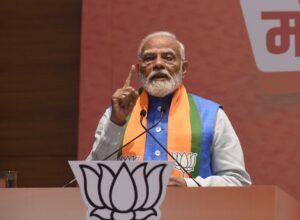Nomination of UAE oil company chief to head COP28 climate talks stirs controversy
Dubai, United Arab Emirates (AFP):
The head of the United Arab Emirates’ national oil company has been named as president of this year’s COP28 climate talks, prompting criticism from environmental activists.
Sultan al-Jaber, chief executive of the UAE’s Abu Dhabi National Oil Company (ADNOC), will be the first CEO to take the role at the UN summit, said a statement cited by official sources.
“I sincerely believe that climate action today is an immense economic opportunity for investment in sustainable growth,” he said, promising a “pragmatic” approach.
Jaber, the UAE’s minister of industry, is also the Gulf state’s special envoy for climate change and has taken part in more than 10 COP meetings.
He is CEO of Masdar, the UAE’s renewable energy company, and has “played a key role in shaping the country’s clean energy path”, the statement said.
But climate activists were quick to criticise his appointment. Harjeet Singh, head of global political strategy at Climate Action Network International, said it “poses an outrageous conflict of interest”.
Teresa Anderson, global lead on climate justice at ActionAid, an NGO, said: “This appointment goes beyond putting the fox in charge of the henhouse.”
And Rachel Kyte, dean of the Fletcher School of international affairs at Tufts University in the US, warned: “The incoming COP president has a dilemma.
“The UAE is competing to be the most efficient and lowest-cost source of fossil fuels as global production must diminish through the energy transition,” she said.
“It will be challenging as COP president to unite countries around more aggressive action while at the same time suggesting that other producers stop producing because UAE has you covered.
“We don’t have the planetary space for mixed messages,” she added.
COP27, held in Egypt in November, concluded with the adoption of a hotly contested text on aid to poor countries affected by climate change, but failed to set new ambitions for lowering greenhouse gas emissions.
The UAE, one of the world’s biggest crude oil producers, will host the next edition in Dubai in November and December. It had the largest contingent of oil and gas lobbyists at last year’s talks.
The Gulf monarchy argues that oil remains indispensable to the global economy and is pushing the merits of carbon capture — removing carbon dioxide, the main greenhouse gas, as fuel is burned or from the air.
The UAE has announced ambitious environmental initiatives, including plans for 20 gigawatts of installed solar capacity by 2030 and a fully operational nuclear power station by 2024.
But the Gulf state also forecasts that the oil and gas industry would need to invest more than $600 billion every year until 2030 to keep up with expected demand.
Former UN climate chief Yvo de Boer offered support for the UAE and Jaber, saying his work in “green growth strategy” and renewable energy give him the “understanding, experience and responsibility” to make COP28 a success.
With its high use of air-conditioning and desalinated water, and ubiquitous SUVs plying 10-lane highways, the UAE was the world’s fourth biggest polluter per capita in 2019, according to the World Bank.












